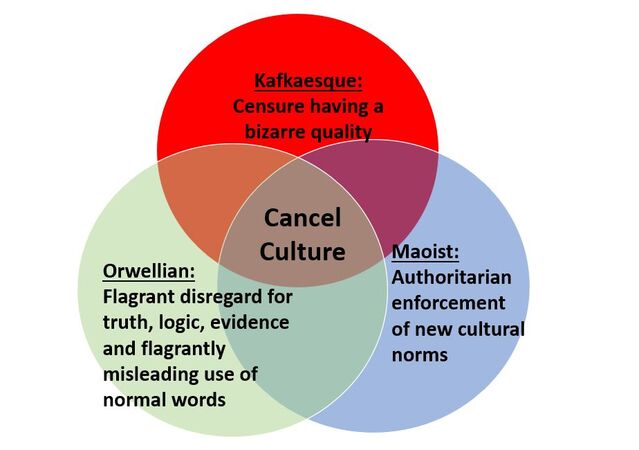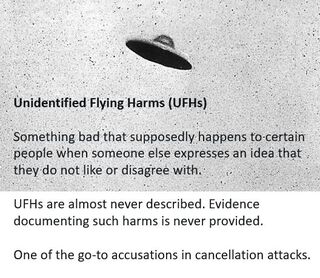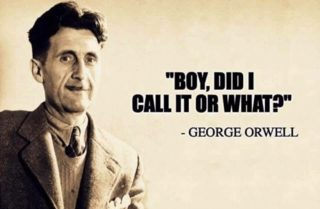Gaslighting
Ten Ways to Tell If You Are Targeted for Cancellation
Knowing the signs might save you.
Posted November 27, 2020 Reviewed by Kaja Perina
You are being denounced by a mob and subject to vile accusations.

You are besieged. You may be accused of being a racist, transphobic, or a traitor. You may be accused of causing “harm,” of “traumatizing” people, of “denying people’s existence” or similarly ridiculous and histrionic charges. Their accusations are mostly or completely false. but social reality can take on a life of its own. If enough people repeat it, it must be true.
"How did this happen?" you ask yourself. You offended them. Who are they? The everything-is-racist/sexist/bigoted/silence-is-violence-but-looting-is-protest/free-speech-for-me-but-not-for-thee offendetrons; the self-appointed Protectors of Morality, the grim-faced commissars of cancel culture. They can be found on both the left and the right denouncing and seeking to punish those they perceive to have violated some sacred Narrative.
And they are coming for you.
What is Cancel Culture?
It is the idea that people should be denounced, publicly humiliated, and punished for completely legitimate ideas or political positions, or for minor mistakes and missteps. The public humiliation, denunciation, and attempt to get you fired or punished is called a "cancellation attack." If it succeeds, you have been "canceled."

10 Ways to Tell if You are the Target of a Cancellation Attack
The sooner you recognize that such an attack is under way, the sooner you can take steps to blunt it and survive it, the topic of my next blog. Here are the earmarks of a cancellation attack:
1. You are being denounced, not criticized. Criticism means someone says "your ideas are factually incorrect or illogical" or "I disagree with you." They explain why. You then can defend your ideas. A discussion ensues, with or without your critic, perhaps with others. Everyone gets closer to enlightenment. Or they don't.

A denunciation is entirely different. Your ideas are not being addressed in any way. Instead, you are accused of doing something deplorable. You might be accused of racism, sexism, transphobia, or some other form of bigotry. You might be accused of being a Nazi or fascist. You might be accused of causing unidentified flying "harms," and of making people "unsafe." For example, David Shor was targeted by a mob of his co-workers, and ultimately fired, after tweeting a link to a political science paper showing that peaceful protests win over more support than do violent ones (he was accused of making his coworkers "unsafe"). For a list of such attacks, go here.
Accusations of "harm" or making people "unsafe" may seem bizarre to most people. And they are right. An idea cannot "harm" someone at least not without some strangely Orwellian twisting of what "harm" means. BUT, it is a brilliant propaganda and tactical move.
- It constitutes victimhood appropriation. By claiming "harm," your attackers are not disagreeing with you; they are claiming victim status! And with the rise of victimhood culture, this gives them power.
- They can now contact Human Resources or your boss to get you fired. No one can make a case for firing you because they disagree with you. But if you are causing "harm"? Now HR can get involved, launch an investigation, and may the gods help you if your tracks are anything but pristine.
2. Its a mob. If it was only a single person, who cares? But its a mob. Most likely, they have used social media or your organization's internal communications platform with unsubstantiated allegations designed to smear your reputation. You might be accused of bullying or bigotry. No one fact checks or asks you.
3. Public shaming. In a healthy organization, if someone has a serious problem with something you did or said, they will usually come to talk to you privately. In an unhealthy one, you will be publicly humiliated. This is not about working with you cooperatively and negotiating away or around disagreements. It is about ostracizing you and sending a message to the entire organization regarding what you better not say or do in public. Often, it constitutes an ideological purge.

4. Flagrant disregard for truth, evidence, or logic. They do not even pretend to provide evidence to back up their accusations, they just declare that you have done something despicable. "No one will take this seriously" you think. Wrong. To your shock and dismay, the rest of the world, most importantly your employer, your HR division, your community seems to take all this quite seriously, as if the mere fact that you are being accused constitutes evidence of your guilt. After all, the psychology is that where there’s smoke, there’s fire. Why would all these people be coming after you unless you actually did something wrong? And even if you did not cross some legal line, who do you think you are, going around offending so many people? We do not need people like you in this organization. Even if you are innocent, you have brought turmoil and undesirable attention to our organization. Do better. Elsewhere.
5. Flagrant rejection of due processes. They have no interest in giving you a chance to defend yourself, interrogating the claims of the denouncers, or questioning your accusers. Everything you say will be used as further evidence that you are despicable.
Let's say you are accused of racism by someone of a different ethnic identity group. You ask your accuser to produce the evidence. This can be turned against you. You may be accused of denying their lived experience and this will be paraded as further evidence of just how racist you are. What if you decide to just not engage?? Your silence will be taken as evidence that you cannot respond to the accusations, and as proof of just how guilty and despicable you actually are.
6. Deplatforming you. No organization should be complicit in your efforts to spread your morally depraved views, your filth and corruption.1

7. Attempt to isolate you by stigmatizing anyone who might support you. Given how despicable you are, anyone who supports you is also despicable -- and a potential target of a cancellation attack. Bystanders will get this message and it will be very hard for them to come forward to defend you, even if they think you are being unfairly targeted.
8. Moral grandstanding. Moral grandstanding refers to publicly taking moral positions to advance one's self-interest in some way, usually one's social status (e.g., esteem or respect among peers). One gets on a soapbox to prove one's moral worth and gain status by denouncing others' moral corruption and filth.1
For example, if being antiracist conveys status, people will be incentivized to denounce you as a racist. They need not necessarily care much whether you are actually racist. But the louder they denounce you as a racist, the more they show the world their antiracist bona fides, so they win, even if they are wrong about you. Moral grandstanding can whip a mob into a frenzy:
Denouncer 1: "Joe is a racist!"
Denouncer 2: "Joe is not just a racist, he is the most vicious racist in this company!"
Denouncer 3: "Joe is not just the most vicious racist in the company, he's a literal Nazi!"
9. Gaslighting. Cancellation attacks are power grabs. Gaslighting occurs when people are deliberately and systematically fed false or misleading information that leads them to question what they know to be true, often about themselves. Variations on "you deserve to be punished" as justification for abuse is a classic form of gaslighting. As per this Psychology Today post gaslighting is "a tactic of manipulation to gain power" and "is a common technique of abusers, dictators, narcissists, and cult leaders." They may claim they are not seeking to get you fired (even though they have contacted your boss). They may claim to be defending the "marginalized" (while marginalizing you) and standing for inclusion (while seeking to exclude you). They may claim, entirely without evidence, that you bullied a co-worker (while they actually bully you).
10. They contact your employer or supervisor. What better way to get you fired than for a mob to make a big stink and then blame you for the stink they just made? Employers usually hate bad publicity. The best way the organization can keep its name clean with respect to accusations of moral taint (such as bigotry) is to fire you.
-------------------------

This blog probably makes it sound as if you are doomed. The situation is bad, but you are not necessarily doomed. My next blog will be Ten Ways You Can Defend Against a Cancellation Attack.
1 "Corruption and filth" was some of the rhetoric used by the actual Nazis (of the 1930s, not the delusions of Nazis to be regularly found on social media) to justify eliminating legal protections of free speech and a free press.
------------------------------------------------------------------
I love replies, but please keep it civil, short, and on topic. A more extensive set of guidelines for commenting can be found here.




